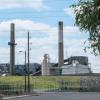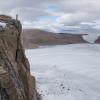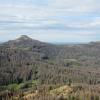Climate & Environment
 <p>Two faculty members in the University of Colorado Boulder’s College of Engineering and Applied Science have been honored with the National Science Foundation’s prestigious CAREER award.</p>
<p>Two faculty members in the University of Colorado Boulder’s College of Engineering and Applied Science have been honored with the National Science Foundation’s prestigious CAREER award.</p>
<p>The NSF Faculty Early Career Development, or CAREER, award supports junior faculty members who demonstrate excellence in research and who effectively integrate their research with education. CU-Boulder’s recent recipients are Prashant Nagpal, an assistant professor of chemical and biological engineering, and Franck Vernerey, an assistant professor of civil, environmental and architectural engineering.</p> <p>Power plants that use natural gas and a new technology to squeeze more energy from the fuel release far less of the greenhouse gas carbon dioxide than coal-fired power plants do, according to a new analysis accepted for publication Jan. 8 in <a href="http://onlinelibrary.wiley.com/doi/10.1002/2014EF000196/abstract"><em>Earth’s Future</em></a>, a journal of the <a href="http://sites.agu.org/">American Geophysical Union</a>. </p>
<p>Power plants that use natural gas and a new technology to squeeze more energy from the fuel release far less of the greenhouse gas carbon dioxide than coal-fired power plants do, according to a new analysis accepted for publication Jan. 8 in <a href="http://onlinelibrary.wiley.com/doi/10.1002/2014EF000196/abstract"><em>Earth’s Future</em></a>, a journal of the <a href="http://sites.agu.org/">American Geophysical Union</a>. </p>- <p>Trees with smoother bark are better at repelling attacks by mountain pine beetles, which have difficulty gripping the slippery surface, according to a new study by the University of Colorado Boulder.</p>
<p>The findings, published online in the journal <em>Functional Ecology</em>, may help land managers make decisions about which trees to cull and which to keep in order to best protect forested properties against pine beetle infestation.</p>  <p>Scientists recently recorded the lowest temperatures on Earth at a desolate and remote ice plateau in East Antarctica, trumping a record set in 1983 and uncovering a new puzzle about the ice-covered continent.</p>
<p>Scientists recently recorded the lowest temperatures on Earth at a desolate and remote ice plateau in East Antarctica, trumping a record set in 1983 and uncovering a new puzzle about the ice-covered continent.</p>
<p>Glaciologist Ted Scambos and his team found temperatures from −92 to −94 degrees Celsius (−134 to −137 degrees Fahrenheit) in a 1,000-kilometer long swath on the highest section of the East Antarctic ice divide. Scambos is lead scientist at the National Snow and Ice Data Center, which is a part of the Cooperative Institute for Research in Environmental Sciences at the University of Colorado Boulder.</p>- <p>A new National Research Council report calls for the development of an early warning system that could help society better anticipate sudden changes resulting from climate change and their impacts on society, says a University of Colorado Boulder faculty member who chaired the committee that produced the report.</p>
- <p>A $671 million NASA mission to Mars led by the University of Colorado Boulder thundered into the sky today from Cape Canaveral, Fla., at 1:28 p.m. EST, the first step on its 10-month journey to Mars.</p>
<p>Known as the Mars Atmosphere and Volatile EvolutioN mission, the MAVEN spacecraft was launched aboard an Atlas V rocket provided by United Launch Alliance of Centennial, Colo. The mission will target the role the loss of atmospheric gases played in changing Mars from a warm, wet and possibly habitable planet for life to the cold dry and inhospitable planet it appears to be today.</p> - <p>America’s once-abundant tallgrass prairies—which have all but disappeared—were home to dozens of species of grasses that could grow to the height of a man, hundreds of species of flowers, and herds of roaming bison.<br /><br />
For the first time, a research team led by the University of Colorado Boulder has gotten a peek at another vitally important but rarely considered community that also once called the tallgrass prairie home: the diverse assortment of microbes that thrived in the dark, rich soils beneath the grass.<br /><br /></p>  <div id="stcpDiv">
<div id="stcpDiv">
<p>The heat is on, at least in the Arctic.</p>
<p>Average summer temperatures in the Eastern Canadian Arctic during the last 100 years are higher now than during any century in the past 44,000 years and perhaps as long ago as 120,000 years, says a new University of Colorado Boulder study.</p></div>- <p>The heat is on, at least in the Arctic.</p>
<p>Average summer temperatures in the Eastern Canadian Arctic during the last 100 years are higher now than during any century in the past 44,000 years and perhaps as long ago as 120,000 years, says a new University of Colorado Boulder study.</p>  <p>A new University of Colorado Boulder study indicates drought high in the northern Colorado mountains is the primary trigger of a massive spruce beetle outbreak that is tied to long-term changes in sea-surface temperatures from the Northern Atlantic Ocean, a trend that is expected to continue for decades.</p>
<p>A new University of Colorado Boulder study indicates drought high in the northern Colorado mountains is the primary trigger of a massive spruce beetle outbreak that is tied to long-term changes in sea-surface temperatures from the Northern Atlantic Ocean, a trend that is expected to continue for decades.</p>


